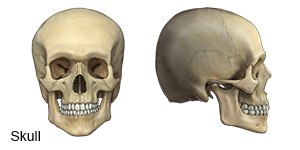Facial Fracture in Children
Medically reviewed by Drugs.com. Last updated on Apr 6, 2025.
A facial fracture is a break in one or more of the bones in your child's face. A facial fracture may also damage nearby tissue.
 |
DISCHARGE INSTRUCTIONS:
Call your local emergency number (911 in the US) if:
- Your child has a seizure.
- Your child has trouble breathing.
Return to the emergency department if:
- Your child becomes confused or more fussy, restless, or sleepy than usual.
- Your child has blood or clear fluid coming from his or her nose or ears.
- Your child has trouble hearing or speaking.
- Your child has blurred or double vision.
- Your child's pupil looks larger in one eye.
Call your child's doctor if:
- Your child has a fever.
- Your child is vomiting.
- Your child has a headache that is getting worse, even after he or she takes pain medicine.
- You have questions or concerns about your child's condition or care.
Medicines:
Your child may need any of the following:
- Acetaminophen decreases pain and fever. It is available without a doctor's order. Ask how much to give your child and how often to give it. Follow directions. Read the labels of all other medicines your child uses to see if they also contain acetaminophen, or ask your child's doctor or pharmacist. Acetaminophen can cause liver damage if not taken correctly.
- NSAIDs , such as ibuprofen, help decrease swelling, pain, and fever. This medicine is available with or without a doctor's order. NSAIDs can cause stomach bleeding or kidney problems in certain people. If your child takes blood thinner medicine, always ask if NSAIDs are safe for him or her. Always read the medicine label and follow directions. Do not give these medicines to children younger than 6 months without direction from a healthcare provider.
- Prescription pain medicine may be given. Ask how to give this medicine to your child safely.
- Antibiotics may be given to help treat or prevent a bacterial infection if the bone broke through skin.
- Do not give aspirin to children younger than 18 years. Your child could develop Reye syndrome if he or she has the flu or a fever and takes aspirin. Reye syndrome can cause life-threatening brain and liver damage. Check your child's medicine labels for aspirin or salicylates.
- Give your child's medicine as directed. Contact your child's healthcare provider if you think the medicine is not working as expected. Tell the provider if your child is allergic to any medicine. Keep a current list of the medicines, vitamins, and herbs your child takes. Include the amounts, and when, how, and why they are taken. Bring the list or the medicines in their containers to follow-up visits. Carry your child's medicine list with you in case of an emergency.
Care for your child after a facial fracture:
- Apply ice on your child's face for 15 to 20 minutes every hour or as directed. Use an ice pack, or put crushed ice in a plastic bag. Cover it with a towel. Ice helps prevent tissue damage and decreases swelling and pain.
- Help your child clean his or her teeth 4 to 5 times a day. It may be hard for your child to clean his or her teeth if an injury or fracture is near his or her mouth. Use a waterpik or a small, soft toothbrush. Ask your child's healthcare provider for information about mouth care.
- Your child may need more rest than he or she realizes while healing. Quiet play will keep your child busy so he or she does not risk injury. Have your child read or draw quietly. Ask your child's healthcare provider how much rest your child needs and when he or she can return to regular activities.
- Do not let your child play sports while the facial fracture heals. The fracture may bleed, bruise easily, or break again. Ask your child's healthcare provider when it is safe for your child to play sports again.
Follow up with your child's doctor as directed:
Write down your questions so you remember to ask them during your visits.
© Copyright Merative 2025 Information is for End User's use only and may not be sold, redistributed or otherwise used for commercial purposes.
The above information is an educational aid only. It is not intended as medical advice for individual conditions or treatments. Talk to your doctor, nurse or pharmacist before following any medical regimen to see if it is safe and effective for you.
Learn more about Facial Fracture
Care guides
Further information
Always consult your healthcare provider to ensure the information displayed on this page applies to your personal circumstances.
